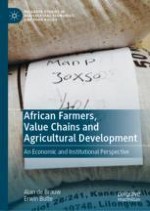2021 | OriginalPaper | Buchkapitel
2. African Agricultural Value Chains: A Brief Historical Overview
verfasst von : Alan de Brauw, Erwin Bulte
Erschienen in: African Farmers, Value Chains and Agricultural Development
Aktivieren Sie unsere intelligente Suche, um passende Fachinhalte oder Patente zu finden.
Wählen Sie Textabschnitte aus um mit Künstlicher Intelligenz passenden Patente zu finden. powered by
Markieren Sie Textabschnitte, um KI-gestützt weitere passende Inhalte zu finden. powered by
